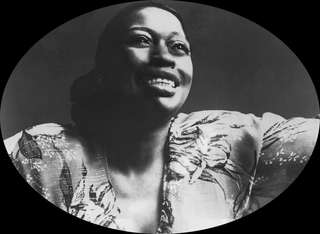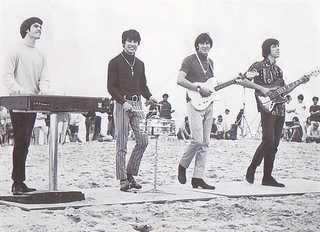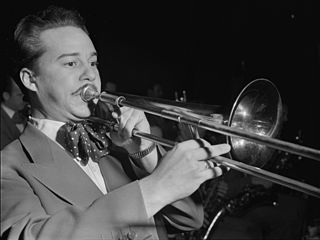Related Research Articles
Rhythm and blues, often abbreviated as R&B, is a genre of popular music that originated in African-American communities in the 1940s. The term was originally used by record companies to describe recordings marketed predominantly to urban African Americans, at a time when "urbane, rocking, jazz based music with a heavy, insistent beat" was becoming more popular. In the commercial rhythm and blues music typical of the 1950s through the 1970s, the bands usually consisted of piano, one or two guitars, bass, drums, one or more saxophones, and sometimes background vocalists. R&B lyrical themes often encapsulate the African-American experience of pain and the quest for freedom and joy, as well as triumphs and failures in terms of relationships, economics, and aspirations.

Doo-wop is a genre of rhythm and blues music that originated among African-American youth in the 1940s, mainly in the large cities of the United States, including New York, Philadelphia, Chicago, Baltimore, Newark, Detroit, and Washington, DC. It features vocal group harmony that carries an engaging melodic line to a simple beat with little or no instrumentation. Lyrics are simple, usually about love, sung by a lead vocal over background vocals of repeated, varying syllables, and often featuring, in the bridge, a melodramatically heartfelt recitative addressed to the beloved. Gaining popularity in the 1950s, doo-wop enjoyed its peak successes in the early 1960s, but continued to influence performers in other genres.

Ruth Alston Brown was an American singer-songwriter and actress, sometimes known as the "Queen of R&B". She was noted for bringing a pop music style to R&B music in a series of hit songs for Atlantic Records in the 1950s, such as "So Long", "Teardrops from My Eyes" and "(Mama) He Treats Your Daughter Mean". For these contributions, Atlantic became known as "the house that Ruth built". Brown was a 1993 inductee into the Rock and Roll Hall of Fame.

Esther Phillips was an American singer, best known for her R&B vocals. She also performed pop, country, jazz, blues and soul music.
Rock and roll emerged as a defined musical style in the United States in the early to mid-1950s. It derived most directly from the rhythm and blues music of the 1940s, which itself developed from earlier blues, boogie woogie, jazz and swing music, and was also influenced by gospel, country and western, and traditional folk music. Rock and roll in turn provided the main basis for the music that, since the mid-1960s, has been generally known simply as rock music.

John Marshall Alexander Jr., known by the stage name Johnny Ace, was an American rhythm-and-blues singer and musician. He had a string of hit singles in the mid-1950s. Alexander died of an accidental self-inflicted gunshot wound at the age of 25.
Lu Pine Records was a small local record label in Detroit, Michigan, active during the late-1950s and 1960s. The label released records by a number of artists, including Joe Stubbs, Eddie Floyd, The Falcons and The Ohio Untouchables.

James David Walker Jr., better known by his stage name Jimmy McCracklin, was an American pianist, vocalist, and songwriter. His style contained West Coast blues, Jump blues, and R&B. Over a career that spanned seven decades, he said he had written almost a thousand songs and had recorded hundreds of them. McCracklin recorded over 30 albums, and earned four gold records. Tom Mazzolini of the San Francisco Blues Festival said of him, "He was probably the most important musician to come out of the Bay Area in the post-World War II years."

Willie Littlefield, Jr., billed as Little Willie Littlefield, was an American R&B and boogie-woogie pianist and singer whose early recordings "formed a vital link between boogie-woogie and rock and roll". Littlefield was regarded as a teenage wonder and overnight sensation when in 1949, at the age of 18, he popularized the triplet piano style on his Modern Records debut single, "It's Midnight". He also recorded the first version of the song "Kansas City", in 1952.

The Yellow Balloon was an American sunshine pop band, formed in Los Angeles in 1967 by songwriter and producer Gary Zekley. The group is notable for featuring Don Grady of Mouseketeers and My Three Sons fame. Other band members hailed from Oregon and Arizona. They were led by Alex Valdez, and included Frosty Green (keyboards), Don Braucht, and Paul Canella. The band at one time also included Daryl Dragon, later the male half of Captain & Tennille.

Edward Joseph Bertolatus, better known as Eddie Bert, was an American jazz trombonist.

"Bad Case of Loving You " is a 1978 song, written and originally recorded by Moon Martin, and sung a year later by Robert Palmer. The song became one of Palmer's definitive hits.
Gerald Granahan is an American singer, songwriter, and record producer, best known for his work in the 1950s and 1960s.
"Tramp" is a soul blues song written by West Coast blues artists Lowell Fulson and Jimmy McCracklin. First recorded by Fulson in 1967, it is described as "a loping funk-injected workout [which restored] the guitarist to R&B stardom", by AllMusic writer Bill Dahl. In the song's narrative, the singer ignores the criticism of his unsophisticated appearance:
John Wayne Carroll, usually known as Gregory Carroll or Greg Carroll, was an American R&B singer, songwriter, and record producer. He was a member of several successful vocal harmony or "doo-wop" groups including The Four Buddies and The Orioles, and co-wrote and produced Doris Troy's 1963 hit "Just One Look".

"Never Ending Song of Love" is a song written by Delaney Bramlett, and, according to some sources, by his wife Bonnie Bramlett. It was originally recorded with his band, Delaney & Bonnie & Friends, in 1971 on the album Motel Shot. Released as a single by Atco Records the same year, "Never Ending Song of Love" became Delaney & Bonnie's greatest hit on the pop charts, reaching a peak of #13 on the Billboard Hot 100 and number eight Easy Listening. It reached #16 in Australia.
The Alley Cats were a musical group active in 1960s. One of their releases saw moderate airplay and chart action.

The Palace Guard was an American garage rock band formed in Los Angeles, California in 1964. Though the band never obtained national success, they made a huge splash in Southern California with their song "Falling Sugar". The group is also notable for featuring the first commercial appearance of Emitt Rhodes, later a member of the Merry-Go-Round.
"This Time" is a song written by Chips Moman, which was first recorded by Thomas Wayne and was released as a single on the Fernwood Records label in March 1958. On March 31, 1958, the song was released on the Mercury Records label, as the B-side of "You're The One That Done It".
References
- ↑ "Marv Goldberg's R&B Notebooks - 4 BUDDIES".
- ↑ "Rhythm & Blues Record Reviews". Billboard: 36. Jan 13, 1951. Retrieved 28 May 2016.
- ↑ Leszczak, Bob (2015). Encyclopedia of Pop Music Aliases, 1950-2000. Rowman & Littlefield. p. 135. ISBN 9781442240070.
- ↑ Leszczak, Bob (2015). Encyclopedia of Pop Music Aliases, 1950-2000. Rowman & Littlefield. p. 136. ISBN 9781442240070.
Bibliography
- Ward, Brian (1998). Just My Soul Responding: Rhythm and Blues, Black Consciousness, and Race . University of California Press. ISBN 0520212983.
- Leszczak, Bob (2015). Encyclopedia of Pop Music Aliases, 1950-2000. Rowman & Littlefield. ISBN 9781442240070.
- "The Four Buddies". Roots and Rhythm. Retrieved April 26, 2008.
| This article on a United States singing group is a stub. You can help Wikipedia by expanding it. |